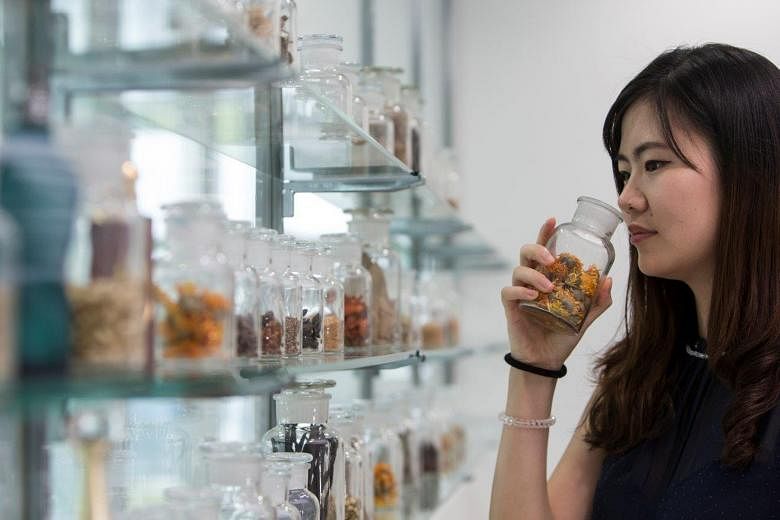If you have always harboured dreams of becoming a perfumer, this might be your chance.
Renowned Swiss fragrance and flavours manufacturer Givaudan has opened its first Perfumery School outside of Paris in Jurong.
The prestigious school opened in 1946, and Givaudan claims it trained the perfumers responsible for about half of the fragrances in the market today. Some of the famous juices concocted by Givaudan perfumers include Thierry Mugler's Angel; Tom Ford's Plum Japonais; Dior's J'Adore and Jean Paul Gaultier's Le Male.
Its outpost in Pioneer Turn - which will follow the same curriculum as the one in Paris - is part of Givaudan's spanking new $100-million Fragrance Creative Centre and Production Hub in Singapore.
Givaudan is keen on grooming the next generation of perfumers familiar with the region as it would give them a competitive advantage in the fast-growing Asian market.
Mr Gilles Andrier, chief executive of Givaudan, says: "These days, fragrances developed for the region are made in the region. The key is to make fragrances that are relevant to the consumer, and are in sync with their culture.
"This fragrance centre is the company's biggest investment in the fragrance division to date. Besides expanding production, we want to build on our fine fragrance business in the region."
Fifteen out of the 18 Givaudan perfumers based in Asia are Asian. There are currently no Singaporeans on the team.
Givaudan is headquartered in Switzerland and has a presence in more than 80 locations, including Brazil, Peru and India. Singapore is the corporation's regional headquarters. In the Asia Pacific, there are three other Creative Centres - in China, India, and Japan - where fragrances are created.
Entry into the school is highly selective. More than a thousand apply for the full-time position in Paris every year and only a handful get in. In Singapore, only two will be accepted a year. Two students - one from Shanghai and another from Taiwan - have already filled this year's slots. The next intake is in September. Those selected will be trained in the Perfumery School for four years, where they will have to memorise the names and scents of hundreds of ingredients, and concoct simple formulas.
Mr Claude Charmoille, executive perfumer and ambassador for the Perfumery School's Singapore campus, says: "It takes eight to 10 years before one becomes a full- fledged perfumer, so one needs a lot of commitment."
The candidate selection process is rigorous. Besides a keen sense of smell, candidates have to possess grit and perseverance because of the long hours spent in the laboratory creating fragrances, which can very well mean being rejected multiple times.
Generally, commercial perfumers are given briefs by clients and they will have to come up with scents to compete for the project. The company that comes up with the winning scent will supply the perfume to the client for as long as the product exists.
Says Mr Andrier: "Perfumers need to have a strong personality and love what they are doing. It is also not just a question of how sensitive their nose is, but how thick their skin is."
Mr Andrier says that some successful applicants - including actors, artists and scientists - have had to "bang on Givaudan's door" for a few years before they gained entry. He declined to name anyone famous who has made the switch to become full-time perfumers. "That is a strong indication of how much they crave the position," he adds.
There will be student exchanges of up to a year between the ones in Paris and here so they get exposure to different markets.
Last year, fragrances made up 48 per cent of the company's sales; the rest are made up of food flavours. Of its fragrance sales, 18 per cent was generated from fine fragrances. Consumer products such as scented household goods made up 69 per cent and other cosmetics, 13 per cent.
Mr Maurizio Volpi, president of the fragrance division, says Singapore is an ideal place for Givaudan to set up the school because consumers here are sophisticated.
"They're fond of perfume, they use some of the best fragrances in the world and they're big consumers of fine fragrances," he says.
That said, it is almost impossible to pinpoint the preferences of consumers in different markets.
Mr Volpi shares: "You can't generalise and say Filipinos like fougere (fern-like) perfumes, or Indonesians don't like colognes. It is all about the execution of the fragrance formulas, so that it resonates with consumers.
"And this can be done only by learning from trial and error, and strong knowledge of the markets."

